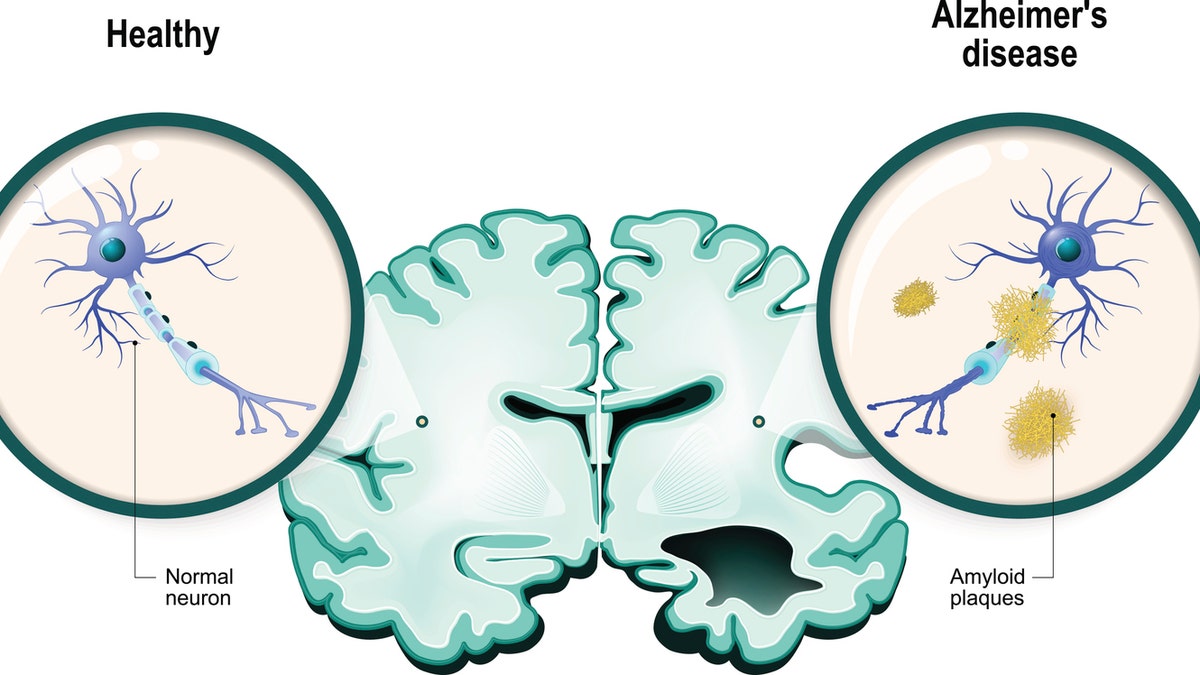Health
Hidden belly fat could signal Alzheimer’s disease risk 15 years before symptoms show up, study finds

Even if you can’t see it, fat buried deep within the belly can increase the risk of Alzheimer’s disease.
That’s according to research released by the Radiological Society of North America (RSNA) on Monday.
Visceral fat, which surrounds the internal organs in the belly, has been linked to brain changes that could point to future dementia in people as young as 50, up to 15 years before symptoms appear, as noted in a press release from RSNA.
BOOST BRAIN HEALTH AND SLOW MENTAL AGING WITH 10 INTRIGUING TIPS FROM LONGEVITY EXPERTS
The findings, published in the journal Aging and Disease, will be presented at the RSNA’s annual meeting next week.
Researchers analyzed the brain MRIs and PET scans of 54 “cognitively healthy” participants between the ages of 40 and 60, focusing on any inflammation and “plaques and tangles” that are typically seen in Alzheimer’s patients.
Fat buried deep within the belly can increase the risk of developing Alzheimer’s disease, according to research released by the Radiological Society of North America (RSNA). (iStock)
They also assessed the middle-aged adults’ body mass index (BMI), obesity levels, blood glucose and abdominal fatty tissue.
“Even though there have been other studies linking BMI with brain atrophy or even a higher dementia risk, no prior study has linked a specific type of fat to the actual Alzheimer’s disease protein in cognitively normal people,” said study author Mahsa Dolatshahi, M.D., post-doctoral research fellow with the Mallinckrodt Institute of Radiology (MIR) at Washington University School of Medicine in St. Louis, in the release.
THE 8 BIGGEST ALZHEIMER’S DISEASE MYTHS — AND THE TRUTHS BEHIND THEM
“Similar studies have not investigated the differential role of visceral and subcutaneous fat, especially in terms of Alzheimer’s amyloid pathology, as early as midlife.”
The researchers found that those with more visceral fat also had higher levels of amyloid in the precuneus cortex, which is the region of the brain that usually shows the earliest signs of Alzheimer’s disease.
They also had greater inflammation in the brain.

Before this research, no prior study has linked a specific type of fat to the actual Alzheimer’s disease protein in cognitively normal people. (iStock)
Men were more likely to show this correlation than women.
“We found the hidden fat-Alzheimer biomarker connection in persons at midlife — 40s and 50s — on average 15 years before the earliest symptoms of Alzheimer’s typically appear,” Raji added.
MEDITERRANEAN DIET COULD HELP REDUCE BELLY FAT AND MUSCLE LOSS CAUSED BY AGING, STUDY FINDS
Visceral fat may also lead to inflammation in the brain, one of the main mechanisms that contribute to Alzheimer’s disease, according to the researchers.
Looking ahead, the hope is that these findings can be a springboard to new targeted treatments.

More than six million Americans are living with Alzheimer’s disease, according to the Alzheimer’s Association. (iStock)
“We found the hidden fat-Alzheimer biomarker connection in persons at midlife — 40s and 50s — on average 15 years before the earliest symptoms of Alzheimer’s typically appear,” Raji added.
Visceral fat may also lead to inflammation in the brain, one of the main mechanisms contributing to Alzheimer’s disease, according to the researchers.
Looking ahead, the hope is that these findings can be a springboard to new targeted treatments.

Researchers analyzed brain MRIs and PET scans of 54 “cognitively healthy” participants between the ages of 40 and 60, focusing on any inflammation and “plaques and tangles” that are typically seen in Alzheimer’s patients. (iStock)
“By moving beyond body mass index in better characterizing the anatomical distribution of body fat on MRI, we now have a uniquely better understanding of why this factor may increase risk for Alzheimer’s disease,” said Raji.
Dr. Marc Siegel, clinical professor of medicine at NYU Langone Medical Center and a Fox News medical contributor, was not involved in the study but said the findings aligned with his expectations.
“This is because belly fat is filled with inflammation,” he told Fox News Digital.
CLICK HERE TO SIGN UP FOR OUR HEALTH NEWSLETTER
“Cytokines and interleukin 6 (inflammatory proteins) not only lead to heart disease, but there is increasing evidence that this inflammation also leads to neurodegenerative disease and poor brain cell function, and can accelerate Alzheimer’s,” Siegel added.
“This study reinforces that association.”
The main limitation of the research is the small sample size and the fact that it’s a cross-sectional study, Raji noted.

One in every five women and one out of 10 men will develop Alzheimer’s disease in their lifetime. (AP Photo/Charles Dharapak, File)
“We are recruiting more participants for this study and want to do a longitudinal version of this work in the future,” he said.
The hope is that the research will help to raise awareness that body and brain health are linked, Raji added.
More than six million Americans are living with Alzheimer’s disease, according to the Alzheimer’s Association.
This number is expected to approach 13 million by 2050.
One in every five women and one out of 10 men will develop the common form of dementia in their lifetime.
For more Health articles, visit www.foxnews.com/health.

Health
MedVi: Real Costs, Facts and Figures | Woman's World

Use left and right arrow keys to navigate between menu items.
Use escape to exit the menu.
Sign Up
Create a free account to access exclusive content, play games, solve puzzles, test your pop-culture knowledge and receive special offers.
Already have an account? Login
Health
Most common causes of cavities in the teeth — and how to prevent them

Cavities are incredibly common, affecting 90% of adults between the ages of 19 and 64 — but they are often preventable.
Also known as “dental caries,” cavities are damaged areas in the hard parts of the teeth caused by tooth decay, according to Mayo Clinic.
These areas become tiny openings or holes that can lead to toothaches, infections and even tooth loss.
How to know if you have a cavity
When a cavity is just starting, you may not have any symptoms at all. That’s why it’s important to be checked regularly at a dentist, says the Centers for Disease Control and Prevention (CDC).
Even if your mouth feels fine, a professional may be able to pick up on smaller signals before the decay grows.
IS OZEMPIC RUINING YOUR TEETH? WHAT TO KNOW ABOUT IMPACT ON DENTAL HEALTH
Once the decay gets larger, there may be symptoms like toothaches, sharp pains when eating, visible holes in the teeth, staining on the surface of a tooth or pain when biting.
Cavities are holes in the teeth through which bacteria can enter. (iStock)
What causes a cavity?
Dental plaque forming in the mouth is what leads to tooth decay, the process that creates cavities.
Plaque forms when bacteria in the mouth mixes with “sugary or starchy food” like milk, juice, bread and pasta, according to Cleveland Clinic.
FLUORIDE EXPOSURE LINKED TO ‘DETRIMENTAL EFFECTS’ ON HEALTH OF PREGNANT WOMEN, INFANTS
If those sugars and starches are not removed from the teeth through healthy habits, like regular flossing and brushing after meals, bacteria begin feeding on them, the above source states.
The acids from bacteria strip away tooth enamel, leaving tiny openings that mark the beginning stages of a cavity. Bacteria and acid can enter through these holes and reach the vulnerable inner parts of the teeth, causing pain and more severe problems.

If you don’t clean sugars and starches off your teeth properly, bacteria begin feeding on them and wearing down the hard outer shell of the tooth. (iStock)
Fox News Digital previously spoke to Dr. Ricky Marshall about the impact of stomach acid and saliva production on dental health.
“The amount of acid coming up and contacting the teeth will absolutely contribute to increased tooth decay,” said Marshall, who is the owner of Stratland Dental in Glendale, Arizona, and a dentist at Wolff Family Dentistry & Orthodontics in Queen Creek, Arizona.
“A combination of dry mouth and increased stomach acid can be detrimental to teeth,” he said.
BRUSH, FLOSS, MOUTHWASH: DENTISTS REVEAL WHAT THEY BELIEVE IS THE CORRECT ORDER
Dry mouth, linked to causes like snoring and potentially certain medications, can increase the risk of tooth decay due to reduced saliva production.
“Your saliva clears away the acid and helps to repair the enamel,” the CDC states on its website. “If the repair isn’t fast enough, bacteria get inside your tooth and make cavities.”

Saliva helps clear away bacteria to keep plaque from forming, so it’s important to treat dry mouth symptoms when they appear, experts say. (iStock)
Ways to prevent cavities
Cleveland Clinic recommends brushing your teeth with a soft-bristled brush twice a day, and ideally after every meal.
CLICK HERE TO SIGN UP FOR OUR HEALTH NEWSLETTER
Experts also recommend cutting back on sugary, starchy foods and drinks. As mentioned above, these can mix with bacteria and promote the buildup of dental plaque.
For more Health articles, visit www.foxnews.com/health
“You should visit your dentist every year, especially to find any cavities,” the CDC advises.
For small cavities, your dentist may recommend using fluoride or other products. Large cavities may require fillings or even root canals.
Health
SkyRX Telehealth: Real Costs, Facts and Figures | Woman's World

Use left and right arrow keys to navigate between menu items.
Use escape to exit the menu.
Sign Up
Create a free account to access exclusive content, play games, solve puzzles, test your pop-culture knowledge and receive special offers.
Already have an account? Login
-

 News1 week ago
News1 week agoRead the Full ‘Make America Healthy Again’ Report
-
Movie Reviews1 week ago
Movie Review: 'Pee-wee as Himself' unmasks Paul Reubens
-

 Technology1 week ago
Technology1 week agoNow you can watch the Internet Archive preserve documents in real time
-

 World1 week ago
World1 week agoNeo-Nazi cult leader extradited to US for plot to kill Jewish children
-

 Technology1 week ago
Technology1 week agoDiscord might use AI to help you catch up on conversations
-

 Movie Reviews1 week ago
Movie Reviews1 week agoMovie review: 'Dogma' re-release highlights thoughtful script – UPI.com
-

 Business1 week ago
Business1 week agoPlastic Spoons, Umbrellas, Violins: A Guide to What Americans Buy From China
-

 Science1 week ago
Science1 week agoTrump Has Cut Science Funding to Its Lowest Level in Decades
















